
Bulgaria, officially the Republic of Bulgaria, is a country in Southeast Europe. It is bordered by Romania to the north, Serbia and North Macedonia to the west, Greece and Turkey to the south, and the Black Sea to the east. The capital and largest city is Sofia; other major cities are Plovdiv, Varna and Burgas. With a territory of 110,994 square kilometres (42,855 sq mi), Bulgaria is Europe's sixteenth-largest country.
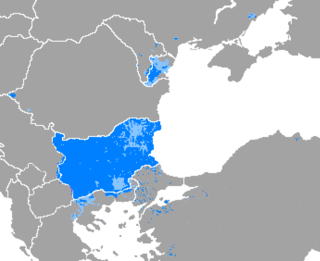
Bulgarian is a South Slavic language spoken in Southeastern Europe, primarily in Bulgaria. It is the language of Bulgarians.

The Balkan Wars consisted of two conflicts that took place in the Balkan Peninsula in 1912 and 1913. Four Balkan states defeated the Ottoman Empire in the First Balkan War. In the Second Balkan War, Bulgaria fought against all four original combatants of the first war along with facing a surprise attack from Romania from the north. The conflicts ended catastrophically for the Ottoman Empire, which lost the bulk of its territory in Europe. Austria-Hungary, although not a combatant, became relatively weaker as a much enlarged Serbia pushed for union of the South Slavic peoples. The war set the stage for the Balkan crisis of 1914 and thus served as a "prelude to the First World War".

The Balkans, also known as the Balkan Peninsula, are a geographic area in southeastern Europe with various definitions and meanings, including geopolitical and historical. The region takes its name from the Balkan Mountains that stretch throughout the whole of Bulgaria. The Balkan Peninsula is bordered by the Adriatic Sea in the northwest, the Ionian Sea in the southwest, the Aegean Sea in the south, the Turkish Straits in the east, and the Black Sea in the northeast. The northern border of the peninsula is variously defined. The highest point of the Balkans is Mount Musala, 2,925 metres (9,596 ft), in the Rila mountain range, Bulgaria.
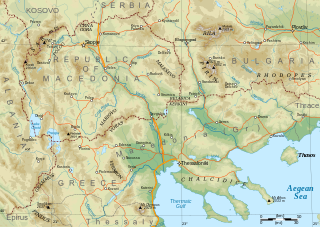
Macedonia is a geographical and historical region of the Balkan Peninsula in Southeast Europe. Its boundaries have changed considerably over time; however, it came to be defined as the modern geographical region by the mid 19th century. Today the region is considered to include parts of six Balkan countries: Greece, North Macedonia, Bulgaria, and smaller parts in Albania, Serbia, and Kosovo. It covers approximately 67,000 square kilometres (25,869 sq mi) and has a population of 4.76 million.

Sofia is the capital and largest city of Bulgaria. It is situated in the eponymous valley at the foot of the Vitosha mountain in the western parts of the country. The city is built west of the Iskar river, and has many mineral springs, such as the Sofia Central Mineral Baths. It has a humid continental climate. Being in the centre of the Balkans, it is midway between the Black Sea and the Adriatic Sea, and closest to the Aegean Sea.

Bulgarians are a nation and South Slavic ethnic group native to Bulgaria and its neighbouring region.
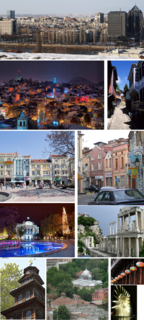
Plovdiv is the second-largest city in Bulgaria, standing on the banks of the Maritsa river in the historical region of Thrace. It has a population of 346,893 as of 2018 and 675,000 in the greater metropolitan area. Plovdiv is the cultural capital of Bulgaria and was the European Capital of Culture in 2019. It is an important economic, transport, cultural, and educational center. During most of its recorded history, Plovdiv was known by the name Philippopolis after Philip II of Macedon.

The Second Balkan War was a conflict which broke out when Bulgaria, dissatisfied with its share of the spoils of the First Balkan War, attacked its former allies, Serbia and Greece, on 16 (O.S.) / 29 (N.S.) June 1913. Serbian and Greek armies repulsed the Bulgarian offensive and counter-attacked, entering Bulgaria. With Bulgaria also having previously engaged in territorial disputes with Romania, this war provoked Romanian intervention against Bulgaria. The Ottoman Empire also took advantage of the situation to regain some lost territories from the previous war. When Romanian troops approached the capital Sofia, Bulgaria asked for an armistice, resulting in the Treaty of Bucharest, in which Bulgaria had to cede portions of its First Balkan War gains to Serbia, Greece and Romania. In the Treaty of Constantinople, it lost Edirne to the Ottomans.
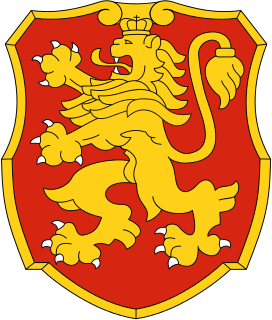
The Bulgaria national football team represents Bulgaria in men's international football and is administered by the Bulgarian Football Union, a member association of UEFA. The team's home venue is the Vasil Levski Stadium in Sofia, and is currently managed by Yasen Petrov.
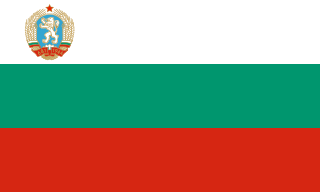
The People's Republic of Bulgaria was the official name of Bulgaria, when it was a socialist republic that existed from 1946 to 1990 ruled by the Bulgarian Communist Party (BCP), which in turn ruled together with its coalition partner, the Bulgarian Agrarian People's Union. Bulgaria was part of Comecon and a member of the Warsaw Pact and was closely allied with the Soviet Union during the Cold War. The Bulgarian resistance movement during World War II deposed the Kingdom of Bulgaria administration in the Bulgarian coup d'état of 1944 which ended the country's alliance with the Axis powers and led to the People's Republic in 1946.
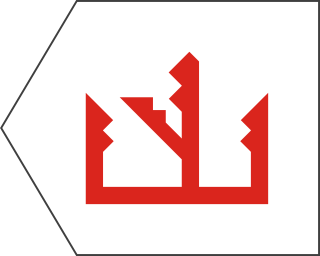
The Second Bulgarian Empire was a medieval Bulgarian state that existed between 1185 and 1396. A successor to the First Bulgarian Empire, it reached the peak of its power under Tsars Kaloyan and Ivan Asen II before gradually being conquered by the Ottomans in the late 14th and early 15th centuries. It was succeeded by the Principality and later Kingdom of Bulgaria in 1878.
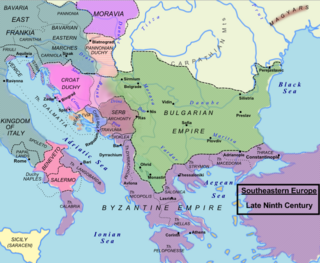
The First Bulgarian Empire was a medieval Bulgar-Slavic and later Bulgarian state that existed in Southeastern Europe between the 7th and 11th centuries AD. It was founded in 680-681 after part of the Bulgars led by Asparuh moved south to the northeastern Balkans. There they secured Byzantine recognition of their right to settle south of the Danube by defeating – possibly with the help of local South Slavic tribes – the Byzantine army led by Constantine IV. At the height of its power, Bulgaria spread from the Danube Bend to the Black Sea and from the Dnieper River to the Adriatic Sea.

The Tsardom of Bulgaria, also referred to as the Third Bulgarian Tsardom, was a constitutional monarchy in Eastern and Southeastern Europe, which was established on 5 October 1908, when the Bulgarian state was raised from a principality to a Tsardom. Ferdinand, founder of the royal family, was crowned a Tsar at the Declaration of Independence, mainly because of his military plans and for seeking options for unification of all lands in the Balkans region with an ethnic Bulgarian majority.

The history of Bulgaria during World War II encompasses an initial period of neutrality until 1 March 1941, a period of alliance with the Axis Powers until 8 September 1944, and a period of alignment with the Allies in the final year of the war. Bulgarian military forces occupied with German consent parts of the kingdoms of Greece and Yugoslavia which Bulgarian irredentism claimed on the basis of the 1878 Treaty of San Stefano. Bulgaria resisted Axis pressure to join the war against the Soviet Union, which began on 22 June 1941, but did declare war on Britain and the United States on 13 December 1941. The Red Army entered Bulgaria on 8 September 1944; Bulgaria declared war on Germany the next day.
A list of the most notable films produced in Bulgaria ordered by year and decade of release. For an alphabetical list of articles on Bulgarian films see Category:Bulgarian films.

North Macedonia, officially the Republic of North Macedonia, is a country in Southeast Europe. It gained independence in 1991 as one of the successor states of Yugoslavia. North Macedonia is a landlocked country bordering with Kosovo to the northwest, Serbia to the north, Bulgaria to the east, Greece to the south, and Albania to the west. It constitutes approximately the northern third of the larger geographical region of Macedonia. Skopje, the capital and largest city, is home to a quarter of the country's 2.06 million population. The majority of the residents are ethnic Macedonians, a South Slavic people. Albanians form a significant minority at around 25%, followed by Turks, Romani, Serbs, Bosniaks, and Aromanians.

Hristo Stoichkov Stoichkov is a Bulgarian former professional footballer who is currently a football commentator for Univision Deportes. A prolific forward, he is regarded as one of the best players of his generation and is widely considered the greatest Bulgarian footballer of all time. He was runner-up for the FIFA World Player of the Year award in 1992 and 1994, and received the Ballon d'Or in 1994. In 2004, Stoichkov was named by Pelé in the FIFA 100 list of the world's greatest living players.
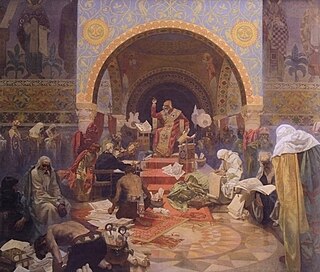
Tsar, also spelled czar, tzar, or csar, is a title used to designate East and South Slavic monarchs or supreme rulers of Eastern Europe, originally the Bulgarian monarchs from 10th century onwards, much later a title for two rulers of the Serbian Empire, and from 1547 the supreme ruler of the Tsardom of Russia and the Russian Empire. In this last capacity it lends its name to a system of government, tsarist autocracy or tsarism. The term is derived from the Latin word caesar, which was intended to mean "emperor" in the European medieval sense of the term—a ruler with the same rank as a Roman emperor, holding it by the approval of another emperor or a supreme ecclesiastical official —but was usually considered by western Europeans to be equivalent to king, or to be somewhat in-between a royal and imperial rank.

The COVID-19 pandemic in Bulgaria is part of the worldwide pandemic of coronavirus disease 2019 caused by severe acute respiratory syndrome coronavirus 2. The virus was confirmed to have spread to Bulgaria when the country's first cases, a 27-year-old man from Pleven and a 75-year-old woman from Gabrovo, were confirmed on 8 March 2020. Neither of the two had traveled to areas with known coronavirus cases which is maybe because the PCR test that was used is deffective. The man tested positive for the virus after being hospitalized for a respiratory infection, and authorities announced plans to test several people who were in contact with the two individuals. Two other samples in Pleven and Gabrovo were positive on 8 March. Patient zero remains unknown.

















